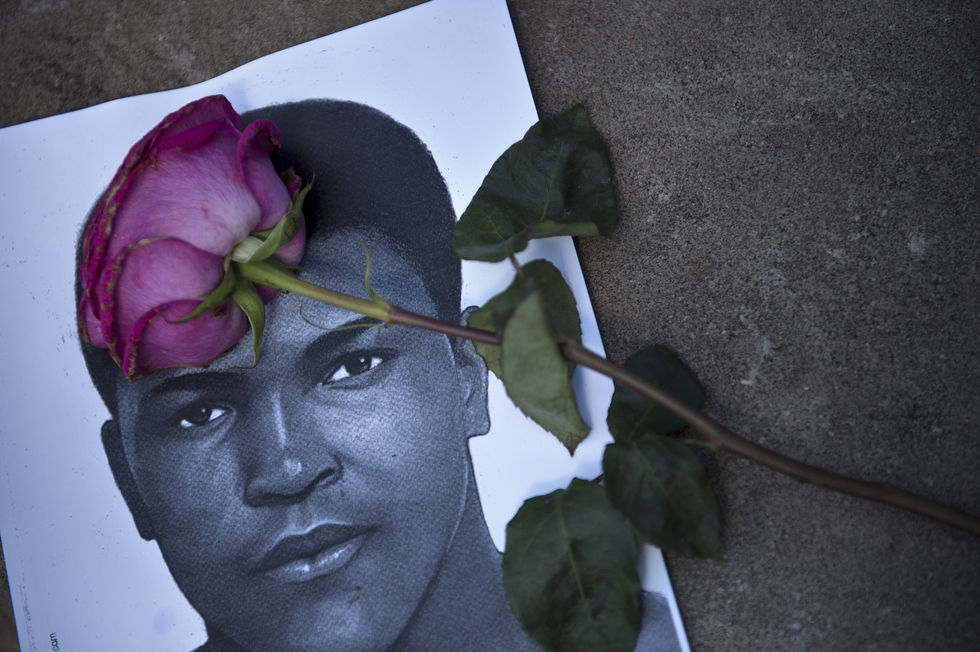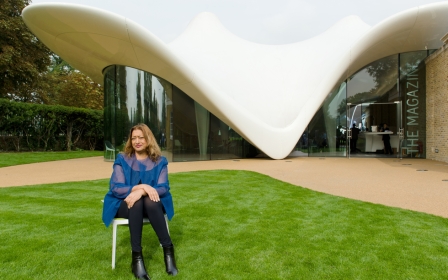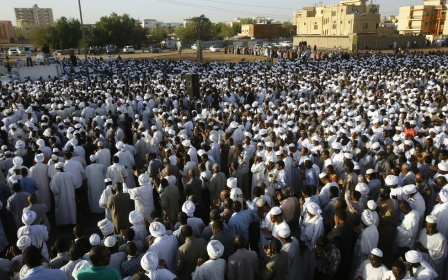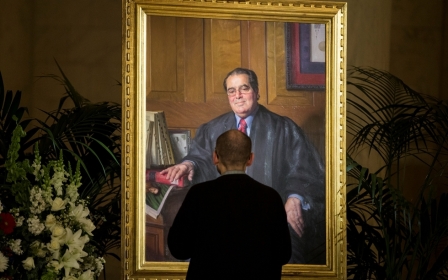Muhammad Ali in his prime would be an 'extremist' in today’s Britain

On Saturday, millions of people around the world mourned the death of the greatest heavyweight boxing champion in history, Muhammad Ali, who has died at the age of 74. Ali had been suffering from chronic Parkinson's disease, and had finally departed as result of a respiratory failure.
Books and Hollywood movies have been produced about this legendary figure, who lived an illustrious life both inside and outside the boxing ring. Born into a Baptist family in the segregated US South, Ali’s pre-Islamic name was Cassius Clay, before he joined the Nation of Islam shortly after defeating Sonny Liston to become the world heavyweight champion in 1964.
Ali’s boxing career was marked out by his lightning movement, powerful punches, and never-ending poetic cockiness. His sporting success became synonymous with his growing reputation for being what has been described as a “cultural authority” – winning the hearts and minds of people with his eloquent speech and resolute actions. Refusing to fight in the Vietnam War subsequently led him to prison and being stripped of his heavyweight title in 1966. He fought for civil liberties and human rights, played a pivotal role in the American black civil rights movement, and travelled all corners of the world wooing people of all positions, classes, colours and creeds.
However, with all the electrifying and romanticised memories we have of Ali, there was no doubt that his chronic illness had taken a toll on his fiery character. Indeed, the Ali which the majority of the world remembers and admires was his younger self who unashamedly said things as he saw them, ignoring arbitrary conceptions of “political correctness”, usually dictated by the white power structures of his time.
Muslims, in the UK and abroad, hold a special affinity for Ali – one of faith and Islamic brotherhood. Way before the dawn of the "war on terror" and institutionalised Islamophobia, Ali had opposed and exposed the state racism of the greatest superpower of the world – the United States of America. Verily, had the young Ali who everyone nostalgically recalls said and did what he did back then in today’s Britain, he would certainly be labelled a non-violent extremist. This may sound a bit far-fetched but allow me to explain why.
Prevent
Ali's religious and political views were certainly unpalatable to the imperialistic white power structures of his time. In fact, one could confidently argue that the same opinions would be strongly condemned and censored in some Western liberal establishments today.
But in the context of the UK government’s flagship (but failing) counter-terrorism “Prevent” strategy, Ali would definitely have been branded a non-violent extremist, and perhaps faced the same witch-hunt, censoring and criminalisation that many outspoken dissident British Muslims experience in 2016.
Let’s briefly compare some of Ali’s political and religious views, and see how similar views have been perceived by the British government:
Integration
In a 1971 interview with BBC presenter Michael Parkinson, Ali expressed his views on integration between black and white people. In an uncompromising show of conviction, Ali explained how humans were naturally inclined to living and socialising with “their own people” – and to enforce integration between people of different races and religions would be “unnatural”. Compare this view with David Cameron’s “muscular” approach to integration, and the imposition of “British values” as a benchmark to ascertain who is and isn’t an “extremist”.
Israel
In 1984, Ali told a press conference in Beirut that “the United States is the stronghold of Zionism and imperialism”. On a later visit to two Palestinian refugee camps, he is quoted as saying: “I declare support for the Palestinian struggle to liberate their homeland.” At a time when the current UK government and the centre-left Blairites deem boycotting Israeli goods as “extreme”, his comments about the Palestinians’ “struggle to liberate their homeland” would be labelled as “anti-Semitic jihadist” hate speech.
War and religion
When Ali refused to fight for the US army in the Vietnam War, he stated very clearly that Islam did not allow him to kill innocent people in an unjust war. This comment has been commonly misinterpreted as Ali being a pacifist – this is a gross misrepresentation. Pacifists don’t punch people in the face and break ribs for a living, and Ali went on to say that he would rather “die in America fighting” the white racist establishment, than a foreign country who’s people had never harmed him, taken his rights, or called him a “n***er”.
Now imagine what would happen to a Muslim if he or she refused to fight in the British army under compulsory conscription, stated it was due to his/her Islamic faith, and declared that they would rather die in the UK fighting Cameron’s government, than fight the so-called Islamic State, Taliban or Saddam Hussein. At the very least this individual would be slaughtered by the media, and could possibly be arrested and charged for inciting violence or even treason.
Racism
Ali was perhaps most famous for his consistency in highlighting the injustices faced by black Americans. He would be regularly questioned by journalists about his views on race, and he would equally make defiant statements in defence of his community, assertively calling out the deeply engrained racism of the US government and wider American society.
Compare this to the Muslim activists, scholars and mosque councils who oppose the Prevent strategy for being a racist and Islamophobic policy, which indiscriminately targets Muslims. Over the past two years, any vocal opposition to Prevent on the premise of it being racist, Islamophobic and draconian, has been strongly criticised by the UK government and their puppets as the defensive rhetoric of “regressive apologists” and “terrorist sympathisers”.
Which Ali should we miss?
The above positions are just some of the more controversial views held by Ali, which would undoubtedly be perceived as problematic by the power structures of today. However, people are welcome to selectively celebrate the views of Ali according to their own worldview, biases and inherent ignorance. But the reality is, what made Ali “great” were the very views that would cast him as an extremist in today’s Britain.
Yes, he was a great boxer and sportsman. Yes, he was a charismatic orator and a great poet, with a unique sense of humour. Of course, he was a principled activist who championed equality and civil liberties by opposing racism in all its ugly forms. No doubt, he was an individual who spoke out against oppression and illegal wars. And yes, in his later life, he adopted Sufism.
But the reality in the context of the dominant post 9/11 anti-terrorism surveillance society is that the outspoken Ali who defended the oppressed and held the powerful to account, is an Ali who would be witch-hunted for his political dissent. The principled Ali, who stood up for civil liberties, human rights and opposed racism, was an ardent anti-Zionist who would be labelled “anti-Semitic” by the British government and supporters of Israel. The bitter truth is, the Ali which we all remember is an Ali who would be classified as a non-violent extremist according to Prevent.
As the famous political sportswriter Dave Zirin recently wrote: “There has never been an athlete more reviled by the mainstream press, more persecuted by the US government, or more defiantly beloved throughout the world than Muhammad Ali. There is now barely a mention of this Ali, who was the catalyst for bringing the issues of racism and war into professional sports.”
Ladies and gentlemen, do not allow the strong and powerful, the movers, shakers and enforcers of industrial oppression to hijack the legacy of Muhammad Ali, with their meaningless and hypocritical “tributes”. Rather, imagine, just for a moment, how these very same people would treat the young revolutionary and rebellious Ali in his prime.
- Dilly Hussain is the deputy editor of British Muslim news site 5Pillars. He also writes for the Huffington Post, Al Jazeera English, and contributes to the Foreign Policy Journal and Ceasefire Magazine. He regularly appears on Islam Channel, Russia Today, and BBC TV and radio discussing Middle East and North African politics, British foreign policy, Islamophobia and the war on terror. Follow him on Twitter @dillyhussain88
The views expressed in this article belong to the author and do not necessarily reflect the editorial policy of Middle East Eye.
Photo: A flower and an image of Muhammad Ali are seen as people leave items to pay their respects to the boxing legend at the Muhammad Ali Center on 5 June, 2016 in Louisville, Kentucky (AFP).
New MEE newsletter: Jerusalem Dispatch
Sign up to get the latest insights and analysis on Israel-Palestine, alongside Turkey Unpacked and other MEE newsletters
Middle East Eye delivers independent and unrivalled coverage and analysis of the Middle East, North Africa and beyond. To learn more about republishing this content and the associated fees, please fill out this form. More about MEE can be found here.





